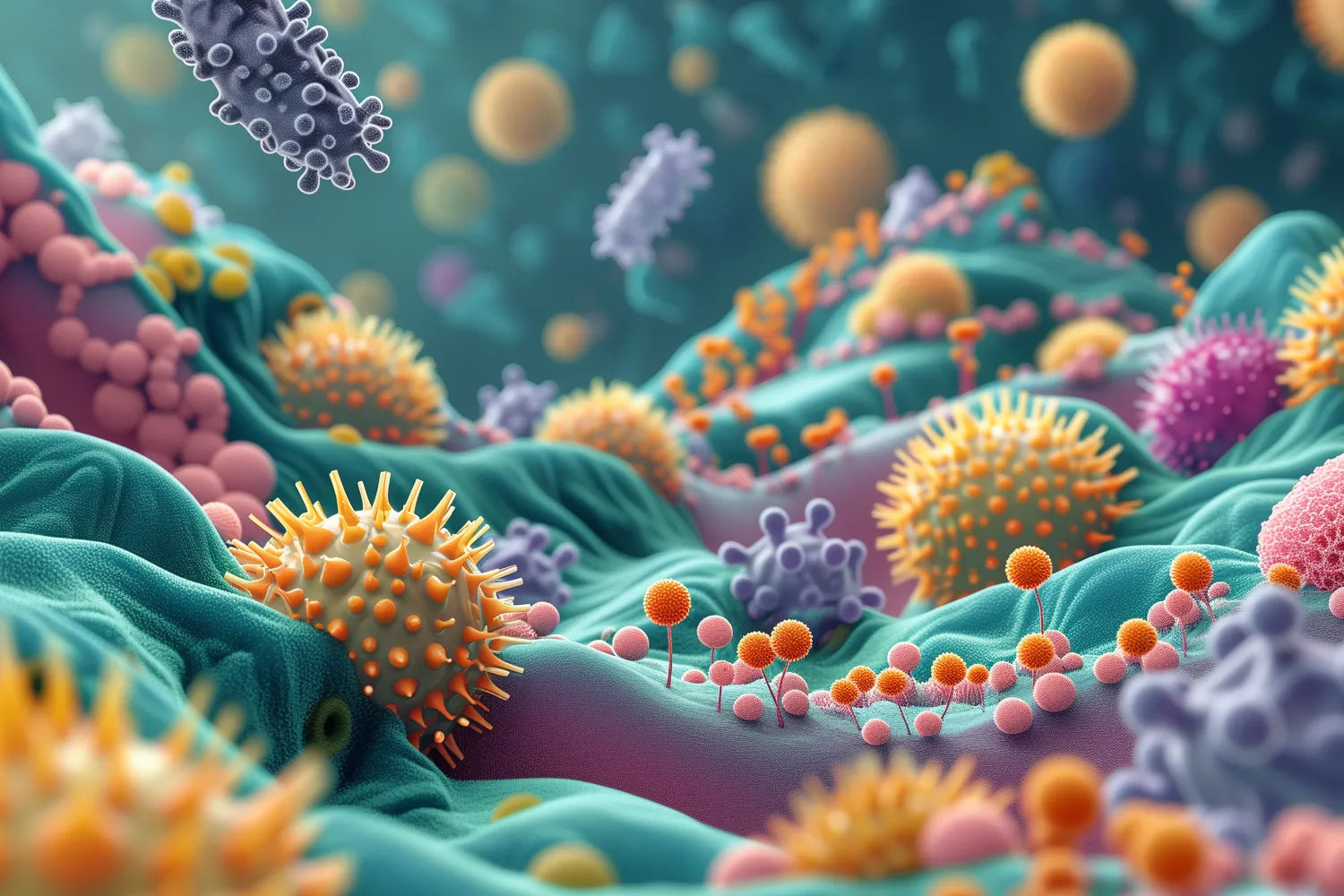
Dr. Eric Venn-Watson’s Highlights
It’s no surprise that we gain weight as we get older. Our metabolism simply slows with age. However, many of us find ourselves wanting to do what we can to keep the scale balanced and age healthfully, without packing on unnecessary pounds.
We’ll take a supplement that claims it helps break down fat because we think it will help us lose weight. The reality is, our bodies do a pretty good job of breaking down fats, and taking a digestive enzyme is not only unnecessary, it can even cause weight gain.
Together we’ll talk about how the body breaks down the fats you eat, what you can do to make sure the process is running smoothly, and how a little fatty acid supplement can help aid digestion better than taking an enzyme.
How Does the Body Digest Fat?
Digestion starts in the mouth. Saliva begins the digestive process by breaking down the food you eat into smaller pieces. In your stomach, acids and enzymes are excreted from the stomach lining that further break down your food.
These smaller pieces can then easily pass into the small intestine, where absorption of nutrients occurs. Most of the digestion of the fats you eat happens in the small intestine. This is where the majority of your digestive enzymes work to break down your food.
The Pancreas
The pancreas produces digestive enzymes that are excreted into the small intestines. These enzymes break down fats, carbohydrates, and proteins, also known as your macronutrients. The liver produces bile which also aids in digestion.
Fats
When you eat a food that contains fats, like an avocado, your body breaks down the fat into small fatty acids. The fatty acids are broken down even further, into tiny, transportable packages called chylomicrons.
These packages are then sent to the bloodstream where they travel all over the body to be delivered where they’re most needed.
Just a few things that fats help your body with include:
- Cellular repair
- Energy
- Fighting infections
- Absorption of essential vitamins
Your body needs fats, and some fatty acids are essential, which means your body requires them for proper function but can’t make them on its own, just like essential vitamins and minerals.
Excess fatty acids are stored in the body in adipose (or fatty) tissue. Fat doesn’t make you overweight, but excess caloric intake (whether it comes from fat, carbohydrates, protein, or a combination of all three) can cause weight gain.
What Are Digestive Enzymes?
Digestive enzymes are the tools your body uses to break down macronutrients into usable molecules for the organs and systems in your body.
There are three main types of digestive enzymes; one for each type of macronutrient.
-
Protease. Protease is a digestive enzyme that breaks down the proteins you eat into amino acids that can be used by your body to grow and repair tissue.
-
Amylase. Amylase is the digestive enzyme that converts carbohydrates into simple sugars. Amylase is secreted by the pancreas, but is also found in your saliva.
-
Lipase. The digestive enzyme that breaks down fats is lipase. Lipase breaks down the fats in your food into fatty acids that can be delivered to the rest of your body as needed.
If lipase is the enzyme that breaks down fat, it seems like it would be an excellent idea to take a lipase supplement to help your body break down fat more efficiently. However, your body is probably doing a superb job of breaking down your fat on its own.
What’s more, studies show that taking a lipase enzyme may make you feel less full, which can contribute to increased hunger. Lipase increases how well your body absorbs fats, so if you aren’t eating a balanced, healthy diet, you could actually gain weight from taking lipase.
Why Should I Take a Digestive Enzyme?
You probably shouldn’t. Unless you’ve been advised by your doctor that you have a condition that is preventing your body from making enough lipase, taking additional lipase may have a negative impact on your health.
However, there are some instances when a digestive enzyme can be helpful.
Who Should Take Digestive Enzymes?
Most of the time, digestive enzymes aren’t necessary. If you suffer from irritable bowel syndrome or have unbalanced gut health, taking a digestive enzyme may help.
If you suspect your digestive system isn’t working as well as it used to, there could be an underlying cause like:
- Insufficient diet (too many or too little calories)
- Alcohol abuse
- Pregnancy
- Smoking
- Dietary sensitivities (gluten, corn, soy, etc.)
- Aging
- Decline in pancreatic and digestive function
Generally, if we think we need digestive enzymes, it’s because we feel like we suffer from slow digestion.
This is characterized by:
- Feeling overly full
- Indigestion (heartburn)
- Bowel irregularity
- Excess weight we can’t seem to lose
There are ways to speed up digestion without taking digestive enzyme supplements, especially if you suspect that, like most of us, your digestion is slowing down because of age.
How Can I Help My Body Break Down Fat?
Your body is made up of cells, and as we age, our cells simply wear out. Cells make up organs that make up entire systems, so when our cells get old and sluggish, digestion can feel sluggish, too.
Thankfully, there are proven ways to be proactive about increasing your cellular health, and giving your digestive system a boost.
Here are three tips to get you back on track and help your body break down fat effectively and efficiently.
1. Eat Better
You have a limited number of calories to take in per day, and those calories have a big responsibility. They need to contain the vitamins, minerals, micronutrients, and macronutrients your body needs to function properly.
When you don’t eat a balanced diet, your body doesn’t function as well as it should. Dietary gaps account for numerous deficiencies that can be corrected by simply eating better.
Making better food choices will not only help you feel better, it will improve your digestion and help you maintain a healthy weight.
2. Exercise More
Nothing can make digestion slower than a sedentary lifestyle. Exercise increases blood flow to all parts of your body, including your digestive tract, which can help the muscles that control digestive flow contract and speed up the digestive process.
If you sit at a desk all day, consider taking a fifteen minute walk on your lunch break, or taking a yoga class after work.
Just a few simple changes to your routine that increase your heart rate and get you moving can improve your digestion.
3. Try a Different Kind of Supplement
Unlike fats in foods that require digestive enzymes to break down the food, FA15™ (the only ingredient in fatty15) is a pure, bioavailable, free fatty acid that is ready to be directly absorbed — no digestive enzymes needed!
How does it work? Pentadecanoic acid.
This acid, also known as C15:0, is an odd-chain, saturated fatty acid that a growing body of research supports is the first essential fatty acid to have been discovered in more than ninety years. That’s a pretty big deal for a little fatty acid.
C15:0 works in your cells two ways:*
-
Cell membranes. As our cells age, our cell walls become flimsy and brittle, allowing external stressors to impact them and change how they work. C15:0 digs into the cell walls to strengthen and fortify them, protecting them so they can stay stronger, longer.
- Mitochondria. The mitochondria in our cells power them to carry out their processes, but over time, mitochondrial function slows. When the mitochondria slow down, we slow down. C15:0 increases mitochondrial function, keeping our cells working hard so our systems work hard, too.
Your slow digestion and inability to break down fat? It could be due to aging cells, and fatty15 is here to reverse cellular aging.* Additionally, fatty15 is made to be easily digested and absorbed.
Elevate your cells. Elevate your self.
Fatty15
Your body is a well-oiled machine, even if you feel more like the Tin Man at times.
In terms of digestion, enzymes produced by your pancreas break down the fats you eat into molecules that can be used by your body. Chances are, your body makes plenty of those enzymes, and taking more won’t help you digest your food any better.
If you’re feeling like your digestion isn’t up to par, tackle it on the cellular level, with the only supplement that contains the pure, vegan form of C15:0 (known as FA15™ ).
Fatty15 can give your cells a fighting chance against aging, and help you live the life you want to live, no matter your age.
Sources:
Digestion and Absorption of Lipids – Nutrition: Science and Everyday Application
Lipase Supplementation before a High-Fat Meal Reduces Perceptions of Fullness in Healthy Subjects

Eric Venn-Watson M.D.
CEO, Co-Founder
Senior Scientist, Co-Founder
Eric is a physician, U.S. Navy veteran, and Co-founder and COO of Seraphina Therapeutics. Eric served over 25 years as a Navy and Marine Corps physician, working with the special forces community to improve their health and fitness. Seraphina Therapeutics is a health and wellness company dedicated to advancing global health through the discovery of essential fatty acids and micronutrient therapeutics.
You May Also Like...
10 Foods Good for Your Liver: The Ultimate Guide
Your liver does a lot for you. If it had a voice of its own, it might ask you to eat more veggies and cut back on your Old Fashioneds. Unfortunately, the liver doesn’t receive a lot of attention until...
How To Improve Your Gut Microbiome: 6 Tips
Interested in how to improve your gut microbiome? We’ve got six tips to help your gut thrive and improve your overall digestion.


